People's Republic
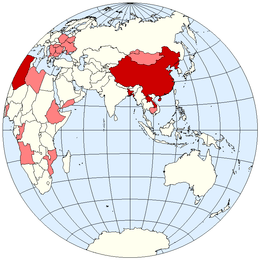
"People's Republic" is a title used by some sovereign states with republican constitutions. The term was initially associated with populist movements in the 19th century such as the German Völkisch movement and the Narodniks in Russia. A number of the short-lived states created during World War I and its aftermath called themselves people's republics. Many of these were in the territory of the former Russian Empire which collapsed following the Russian Revolution of 1917. Additional people's republics were created following the Allied victory in World War II. The term has become associated with countries adhering to socialism, although its use is not unique to such states. A number of republics with liberal democratic political systems, such as Bangladesh and Algeria, adopted the title after popular wars of independence given its rather generic nature.
Marxist–Leninist people's republics (people's democracy)
The first Marxist–Leninist people's republics that came into existence were those formed following the Russian Revolution. Ukraine was briefly declared a people's republic in 1917,[1] and in 1920 the Khanate of Khiva[2] and the Emirate of Bukhara,[3] both territories of the former Russian Empire, were declared people's republics. In 1921 the Russian protectorate of Tuva became a people's republic,[4] followed in 1924 by neighbouring Mongolia.[5] Following World War II, developments in Marxist–Leninist theory led to the appearance of people's democracy, a concept which potentially allowed for a route to socialism via multi-class, multi-party democracy. Countries which had reached this intermediate stage were called people's republics.[6] The European countries that became people's republics at this time were Albania,[7] Bulgaria,[8] Czechoslovakia,[9] Hungary,[10] Poland,[11] Romania[12] and Yugoslavia.[13] In Asia, China became a people's republic following the Chinese Communist Revolution[14] and North Korea also adopted Marxism–Leninism to become a people's republic.[15]
Many of these countries also called themselves socialist states in their constitutions. During the 1960s Romania and Yugoslavia ceased to use the term people's in their official name, replacing it with the term socialist as a mark of their ongoing political development. Czechoslovakia also added the term socialist into its name during this period; it had become a people's republic in 1948 but had not used that term in its official name.[16] Albania used both terms in its official name from 1976 to 1991.[17] In the West these countries are often referred to as communist states. However, none of them described themselves in that way; they regarded communism as a level of political development that they had not yet reached.[18] The communist parties in these countries often governed in coalitions with other progressive parties.[19]
During the postcolonial period a number of former European colonies that had achieved independence and adopted Marxist-Leninist governments took the name people's republic. Angola,[20] Benin, Congo-Brazzaville,[21] Ethiopia, Cambodia, Laos, Mozambique and South Yemen followed this route. Following the Revolutions of 1989, the people's republics of Central and Eastern Europe (Albania, Bulgaria, Hungary and Poland) along with Mongolia dropped the term people's from their names as it was associated with their former communist governments. They became known simply as republics and adopted liberal democracy as their system of government. At around the same time most of the former European colonies that had taken the people's republic name began to replace it as part of their move away from Marxism-Leninism.
The current officially socialist states that include the words people's republic in their full names:

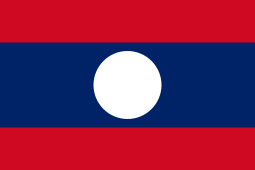

Historical examples include:
.svg.png)
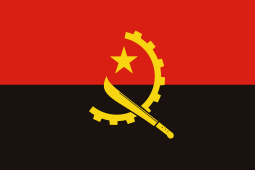
.svg.png)
.svg.png)
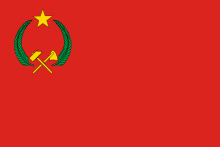
.svg.png)

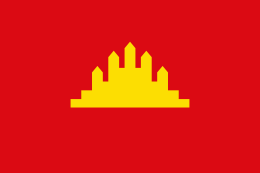
.svg.png)
.svg.png)
.svg.png)

.svg.png)
.svg.png)
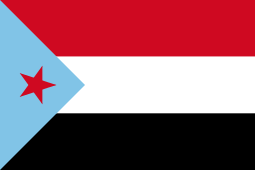
.svg.png)
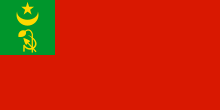
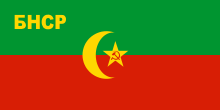

Other titles commonly used by Marxist–Leninist and socialist states are democratic republic (e.g. the German Democratic Republic or the Democratic Federal Yugoslavia between 1943 and 1946) and socialist republic (e.g. the Socialist Republic of Vietnam and the Czechoslovak Socialist Republic).
Non-Marxist–Leninist People's Republics
Founded in socialist ideals, though not necessarily communist:
Current


- Unrecognized
The following separatist movements have declared People's Republics, but have not received diplomatic recognition from the international community:
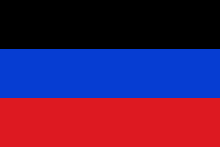

Historical
.svg.png)


.svg.png)
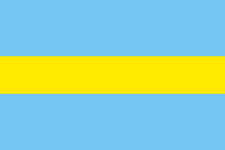
.svg.png)
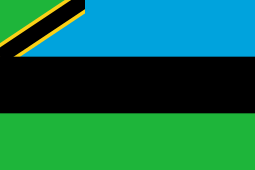
The People's Republic of Bavaria is a name sometimes used for the People's State of Bavaria (German: Freier Volksstaat Bayern), a short-lived socialist state formed in Bavaria during the German Revolution of 1918–19 as a rival to the Bavarian Soviet Republic.
Other uses
The term "People's Republic" is sometimes used by critics and satirists to describe areas perceived to be dominated by left-wing politics. Some examples are the People's Republic of New Jersey,[22] the People's Republic of California,[23] the People's Republic of Dublin South-Central,[24] the People's Republic of South Yorkshire, the People's Republic of Boulder,[25] the People's Republic of Brighton,[26] the People's Republic of Madison,[27] and the People's Republic of Takoma Park.[28]
See also
References
| Look up people's republic in Wiktionary, the free dictionary. |
- ↑ Åslund, Anders (2009). How Ukraine Became a Market Economy and Democracy. Peterson Institute. p. 12. ISBN 9780881325461.
- ↑ Minahan, James (2013). Miniature Empires: A Historical Dictionary of the Newly Independent States. Routledge. p. 296. ISBN 9781135940102.
- ↑ Tunçer-Kılavuz, Idil (2014). Power, Networks and Violent Conflict in Central Asia: A Comparison of Tajikistan and Uzbekistan. Routledge advances in Central Asian studies. Volume 5. Routledge. p. 53. ISBN 9781317805113.
- ↑ Khabtagaeva, Bayarma (2009). Mongolic Elements in Tuvan. Turcologica Series. Volume 81. Otto Harrassowitz Verlag. p. 21. ISBN 9783447060950.
- ↑ Macdonald, Fiona; Stacey, Gillian; Steele, Philip (2004). Peoples of Eastern Asia. Volume 8: Mongolia–Nepal. Marshall Cavendish. p. 413. ISBN 9780761475477.
- ↑ White, Stephen (2002). Communism and Its Collapse. Routledge. p. 13. ISBN 9781134694235.
- ↑ Gjevori, Elvin (2018). Democratisation and Institutional Reform in Albania. Springer. p. 21. ISBN 9783319730714.
- ↑ Stankova, Marietta (2014). Bulgaria in British Foreign Policy, 1943–1949. Anthem Series on Russian, East European and Eurasian Studies. Anthem Press. p. 148. ISBN 9781783082353.
- ↑ Müller-Rommel, Ferdinand; Mansfeldová, Zdenka (2001). "Chapter 5: Czech Republic". In Blondel, Jean; Müller-Rommel, Ferdinand. Cabinets in Eastern Europe. Palgrave Macmillan. p. 62. doi:10.1057/9781403905215_6. ISBN 978-1-349-41148-1.
- ↑ Hajdú, József (2011). Labour Law in Hungary. Kluwer Law International. p. 27. ISBN 9789041137920.
- ↑ Frankowski, Stanisław; Stephan, Paul B. (1995). Legal Reform in Post-Communist Europe: The View from Within. Martinus Nijhoff. p. 23. ISBN 9780792332183.
- ↑ Paquette, Laure (2001). NATO and Eastern Europe After 2000: Strategic Interactions with Poland, the Czech Republic, Romania, and Bulgaria. Nova. p. 55. ISBN 9781560729693.
- ↑ Lampe, John R. (2000). Yugoslavia as History: Twice There Was a Country. Cambridge University Press. p. 233. ISBN 9780521774017.
- ↑ "The Chinese Revolution of 1949". Office of the Historian, Bureau of Public Affairs. United States Department of State.
- ↑ Kihl, Young Whan; Kim, Hong Nack (2014). North Korea: The Politics of Regime Survival. Routledge. p. 8. ISBN 9781317463764.
- ↑ Webb, Adrian (2008). The Routledge Companion to Central and Eastern Europe Since 1919. Routledge Companions to History. Routledge. pp. 80 & 88. ISBN 9781134065219.
- ↑ Da Graça, John V (2000). Heads of State and Government (2nd ed.). St. Martin's Press. p. 56. ISBN 978-1-56159-269-2.
- ↑ Wilczynski, J. (2008). The Economics of Socialism after World War Two: 1945-1990. Aldine Transaction. p. 21. ISBN 978-0202362281.
Contrary to Western usage, these countries describe themselves as 'Socialist' (not 'Communist'). The second stage (Marx's 'higher phase'), or 'Communism' is to be marked by an age of plenty, distribution according to needs (not work), the absence of money and the market mechanism, the disappearance of the last vestiges of capitalism and the ultimate 'whithering away' of the State.
- ↑ Wegs, J. Robert (1996). Europe since 1945: A Concise History. Macmillan International Higher Education. pp. 28–9. ISBN 9781349140527.
- ↑ "Popular Movement for the Liberation of Angola". Encyclopaedia Britannica.
- ↑ Hughes, Arnold (2015). Marxism's Retreat from Africa. Routledge. pp. 10–11. ISBN 9781317482369.
- ↑ Welcome to the People's Republic of New Jersey, Alan Caruba, 28 June 2004, enterstageright.com
- ↑ Roger Hedgecock (14 October 2011). "Dispatch From the People's Republic of California". Human Events. Townhall Media. Retrieved 2 June 2016.
Michael Levi (4 December 2012). "The People's Republic of California". Foreign Policy. Retrieved 2 June 2016. - ↑ Ciara Treacy (27 February 2016). "Dublin South Central: 'It's the right thing to do' Fianna Fail candidate calls for full recount"".
- ↑ "Go Local in Boulder". Colorado.com. Retrieved 15 August 2017.
- ↑ Emma Yeomans (16 May 2015). "More than 12,000 Brighton and Hove residents 'declare independence' from blue Britain". The Argus. Brighton, UK.
- ↑ Polarisation in the People's Republic of Madison (sic) The Economist. June 5, 2012. Accessed April 19, 2014.
- ↑ "- The Washington Post". Washington Post. Retrieved 2018-04-26.